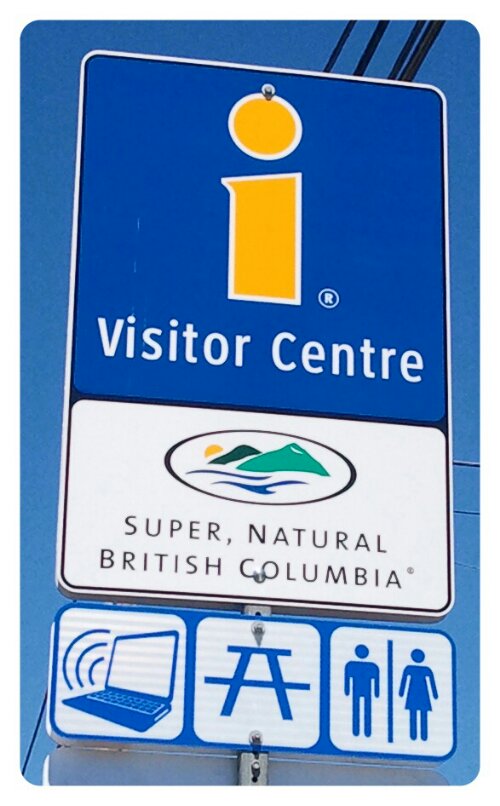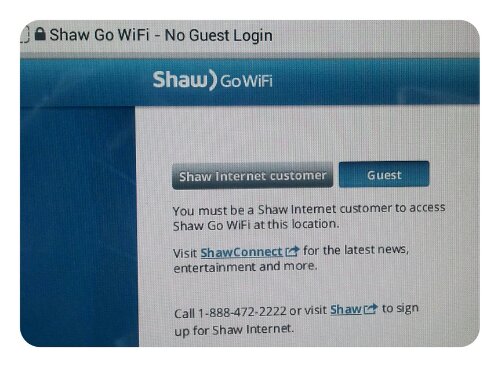Disclaimer: I don’t mean to be disrespectful towards other places in this world where things are organized differently and where maybe notions of what is considered public and what is private are different. My point is rather a critique of Berlin’s current „partnership“ with a private company that offers wifi partly free of charge. What I saw in Canada helps me to explain my point of view.
On my journey, I found a nice example of why it is a bad idea for municipalities to let private companies run their „public wifi“ infrastructure. At home, in Berlin, the discussions have been going on for years and it looks as if this was the preferred approach: A contract with a private company that gets quite a lot of money (about 300.000 €) for setting up relatively few (100) access points around chosen points of interest for tourists. (Links in German only, sorry! Sponsor: the regional media authority of Berlin and Brandenburg, Daily newspaper „Der Tagesspiegel“, critical blog post by ccm, just to name a few.)
 In British Columbia/Canada, I saw this unencrypted wifi network called „OpenShaw“ everywhere: in Victoria, in Vancouver, even in the middle of nowhere on Vancouver Island. On signs like this one, it is clearly announced as a special feature of the municipality. And the name clearly suggests that this an open wifi network. On tourist maps of Victoria, BC, there was a „free wifi“ announced that I didn’t have the opportunity to try (called „Victoria wifi“). Wow, how cool is that?! The deception when you realize it’s all commercial and closed… You end up on a splash page where you can either enter your customer credentials or use the „Guest“ button. Unfortunately, at all four locations the guest login was not available – how misleading!
In British Columbia/Canada, I saw this unencrypted wifi network called „OpenShaw“ everywhere: in Victoria, in Vancouver, even in the middle of nowhere on Vancouver Island. On signs like this one, it is clearly announced as a special feature of the municipality. And the name clearly suggests that this an open wifi network. On tourist maps of Victoria, BC, there was a „free wifi“ announced that I didn’t have the opportunity to try (called „Victoria wifi“). Wow, how cool is that?! The deception when you realize it’s all commercial and closed… You end up on a splash page where you can either enter your customer credentials or use the „Guest“ button. Unfortunately, at all four locations the guest login was not available – how misleading! Instead one was asked to register (see screenshot).
Instead one was asked to register (see screenshot).
In Victoria, according to the local news, the deal was the following: The city of Victoria and that same company, Shaw, have a five-year contract. The company creates a separate wifi network for Victoria. Customers can use it (obviously), while non-subscribers „get free access for 60 minutes a month.“ Everyone can access the city website. Other companies could come and make a similar deal with the city, too. (For more details, please visit the link above.)
So why do I think this concept is a bad idea?
- Call me old-school but I expect any infrastructure advertized as public by a municipality to be available for the public. In contrast to private, commercial offers, public services mostly have this component of solidarity. People who pay less than others or nothing can benefit from the same service. This notion is completely missing here because…
- … an hour per month or let’s say two minutes per day without charge is ridiculously little. Such a network is no benefit for the inhabitants and hardly useful for tourists unless they become paying customers.
- On other access points, outside Victoria, the guest option was disabled. So basically one could say the municipalities advertize an open wifi as one of their special features for tourists – only that there is no such thing as an open wifi. It’s just municipalities that help a single company earn money without any benefit for the public.
So I don’t favour a single company to run an open wifi for the public. Nor do I like the idea of a state-run infrastructure monopoly. My favourite solution: A shared and distributed infrastructure based on open standards and built by as many participants as possible, by persons, non-profit organizations, companies. This idea is not new. I picked it up from freifunk people. Why didn’t/doesn’t the Berlin senate define non-encrypted mesh networking as the technological standard for the wifi and then whoever wants can set up their own access points and build the public wifi together using the same technology? The senate rejected the idea at the beginning of 2010 – allegedly because it was technically impossible to realize and furthermore mobile data connections had become so much „cheaper“. Erm…
By the way, it seems there was a small initiative like this in Victoria, too. Their idea was to win over businesses in Victoria to share part of their bandwidth in a public mesh network. In return they could advertise their business on the splash page of their access point. In 2011, they seem to have applied for a grant from the city that was declined. Among other reasons: „The project does not (…) align with Council key priorities.“
The „closed public wifi“ in British Columbia is an excellent blueprint for Berlin as yet another failed effort. In the meantime, freifunk and similar community-driven grassroots initiatives are flourishing again – that’s the good news.